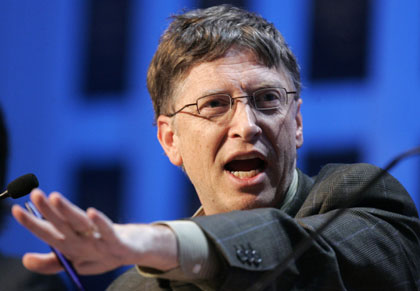Internet to revolutionize TV in 5 years: Gates
(aaa)Updated: 2007-01-28 08:39
"I'm stunned how people aren't seeing that with TV, in five years from now, people will laugh at what we've had," he told business leaders and politicians at the World Economic Forum.
The rise of high-speed Internet and the popularity of video sites like Google Inc's YouTube has already led to a worldwide decline in the number hours spent by young people in front of a TV set.
In the years ahead, more and more viewers will hanker after the flexibility offered by online video and abandon conventional broadcast television, with its fixed program slots and advertisements that interrupt shows, Gates said.
"Certain things like elections or the Olympics really point out how TV is terrible. You have to wait for the guy to talk about the thing you care about or you miss the event and want to go back and see it," he said.
"Internet presentation of these things is vastly superior."
At the moment, watching video clips on a computer is a separate experience from watching sitcoms or documentaries on television.
But convergence is coming, posing new challenges for TV companies and advertisers.
"Because TV is moving into being delivered over the Internet -- and some of the big phone companies are building up the infrastructure for that -- you're going to have that experience all together," Gates said.
YouTube co-founder Chad Hurley said the impact on advertising would be profound, with the future promising far more targeted ads tailored to each viewer's profile.
"In the coming months we're going to do experiments to see how people interact with these ads to build an effective model that works for advertisers and works for users," he said.
Advertisers are already racing to adapt their strategies to the growing power of the Web, and more and more promotional cash is tipped to migrate from television to Web sites in future.
|
||
|
||
|
|

